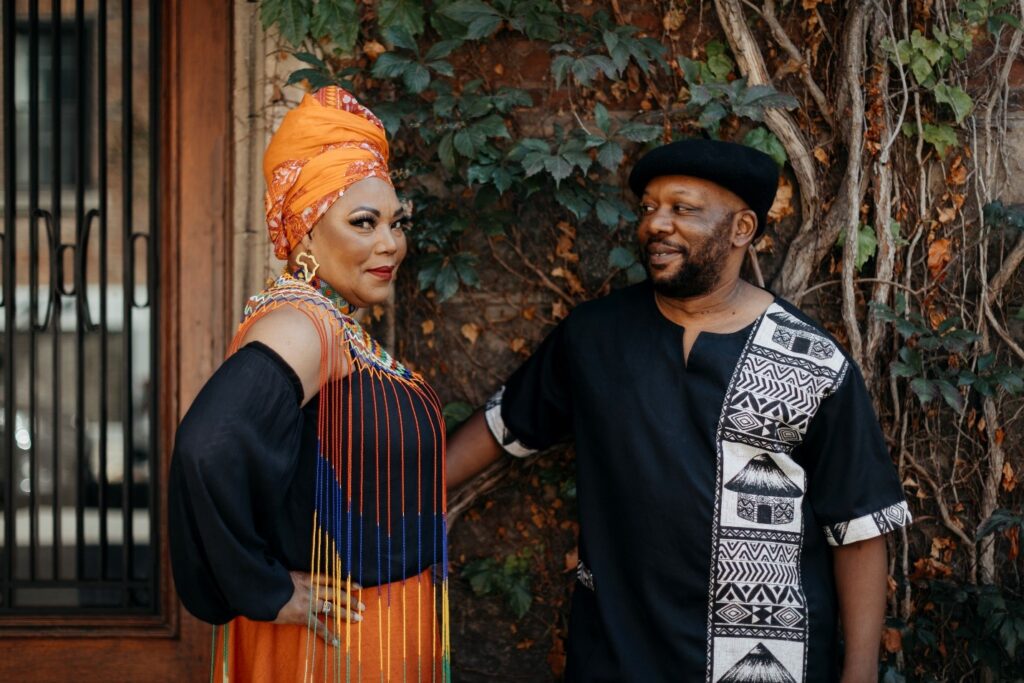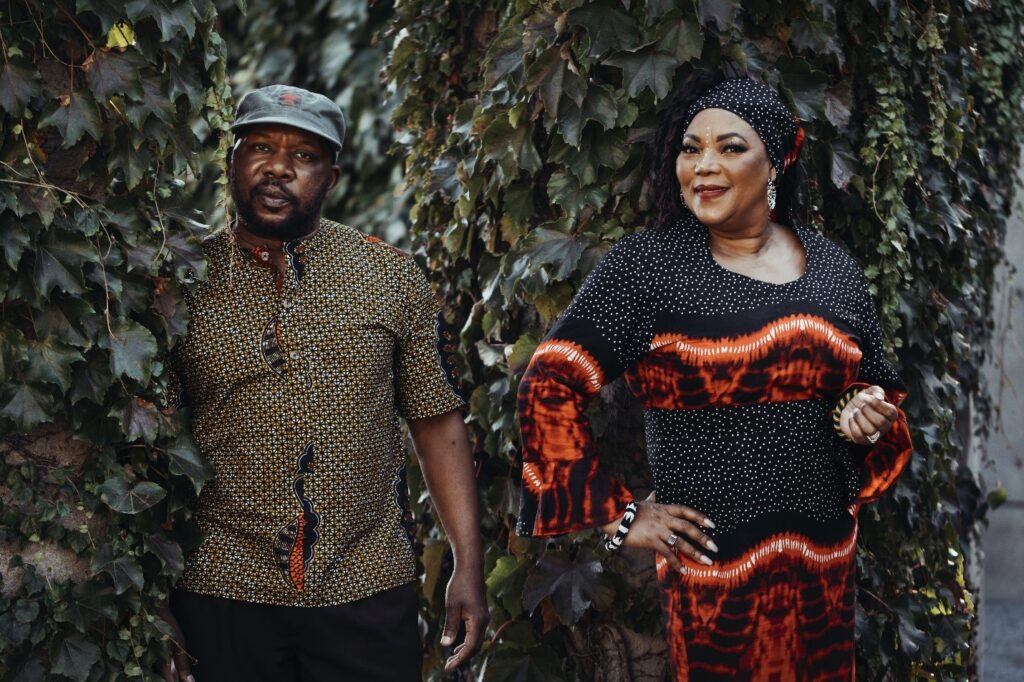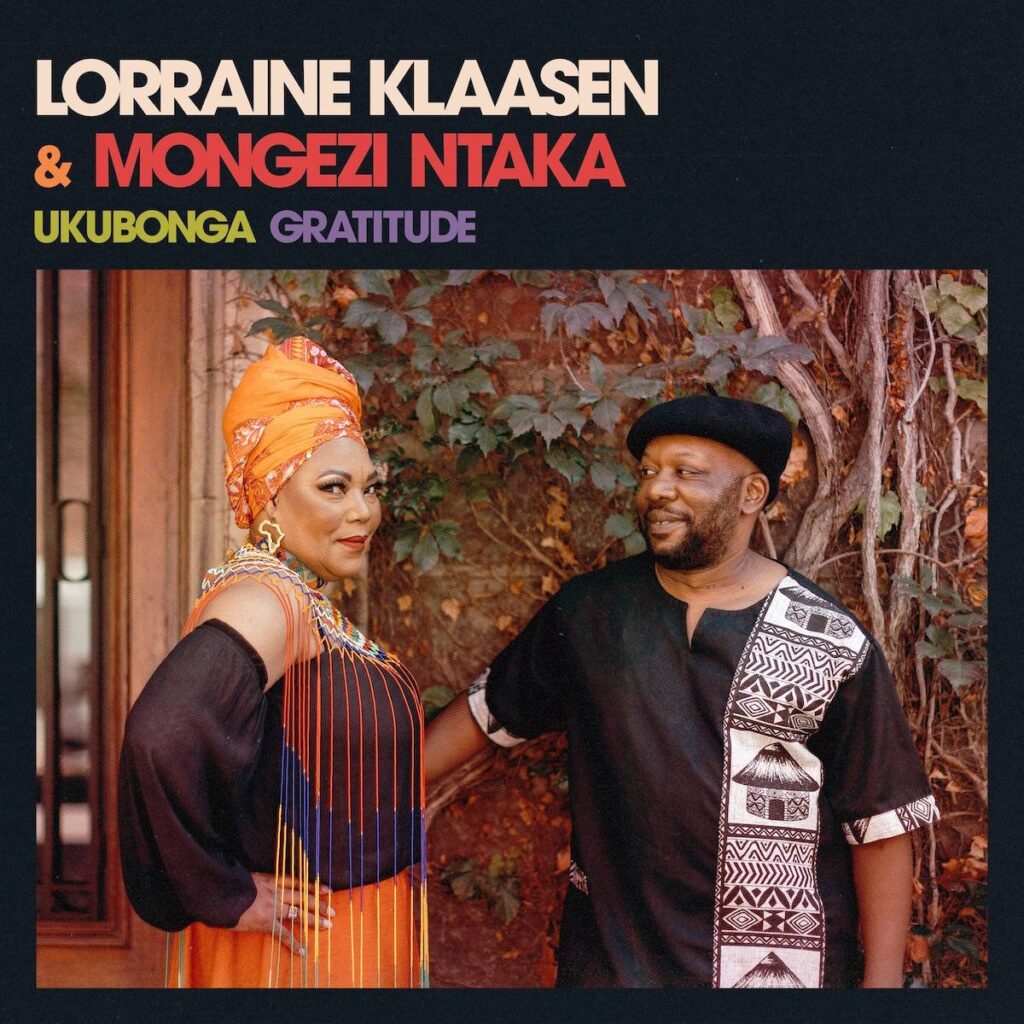The new album “Ukubonga [Gratitude]” by Lorraine Klaasen and Mongezi Ntaka was released on Justin Time Records on November 11.
A collection of songs from Southern Africa’s Township music songbook, Ukubonga [Gratitude] is the latest album from South African singer Lorraine Klaasen and South African guitarist, composer, arranger, musical director, and producer Mongezi Ntaka. It features songs written by some of Southern Africa’s most renowned singers and composers. Lorraine & Mongezi made the decision to express their gratitude to the hardworking musicians who pursued their musical careers in order to support their families, enduring and surviving some of the most gruesome and humiliating experiences a person can go through. Both Lorraine and Mongezi shared some of the hardships this generation of artists endured in South Africa during the dreadful apartheid era, though not to the same degree as these renowned artists, whose songs Lorraine and Mongezi are using to reaffirm the fundamental value of gratitude to Africans.
Much of Southern Africa, including South Africa, has a soundtrack that is dominated by township music. This sound originates from a people who have successfully overcome extremely challenging circumstances. Through its adaptability to new technologies, Township music has helped to preserve many of Africa’s indigenous cultures and has influenced political and social change. Some of the musicians and songwriters whose songs are featured on Ukubonga [Gratitude] were professionally associated with Lorraine & Mongezi, and they also had personal friendships and family ties with them.
The messages of African romantic courtships, wedding songs, social and political commentary, consciousness, and cultural pride that is rich in the wisdom of the elders are at the core of this album. The desire of Lorraine & Mongezi to spread awareness of a musical culture that is superior to all others in the world served as the inspiration for this album. Sadly, almost all of the musicians whose songs are featured on this project are no longer with us, but they left behind an incredible body of work that should serve as a constant reminder to African children of the value of Ukubonga [Gratitude]. Check out the album and the exclusive interview below:

1. Can you tell us a bit about where you come from and how it all got started?
Mongezi: I come from Benoni in Gauteng province in South Africa.
Lorraine: I come from South Africa, grew up in the East Rand same as Mongezi
2. Did you have any formal training or are you self-taught?
Mongezi: First I started as a self-taught musician and then went on to take music lessons at Dorkey House in Johannesburg, South Africa.
Lorraine: I had no formal training, I inherited this gift of music from my Late Mother Thandie Klaasen. I knew when I was young that this is what I am going to do with my life- singing and making people happy with my music
3. Who were your first and strongest musical?
Mongezi: The Dark City Sisters and Mahlathini & The Mahotella Queens are my biggest influence because of their dedication to indigenous African music.
Lorraine: obviously my mother, I admired Vicky Mhlongo later known as Busi Mhlongo, and Nancy Wilson, Shirely Bassie
4. What do you feel are the key elements in your music that should resonate with listeners, and how would you personally describe your sound?
Mongezi: Strong rhythms and simple melodies are the foundation of township music and our sound has those elements that make our music easily accessible to audiences.
Lorraine: my key elements are the fact that I kept my culture even during the time when everyone around me was copying American music.
My sound is unique, people can identify who I am by listening to my music.

5. For most artists, originality is first preceded by a phase of learning and, often, emulating others. What was this like for you? How would you describe your own development as an artist and music maker, and the transition towards your own style?
Mongezi: I have been exposed to all kinds of music that sometimes has influenced me but for the most part I rely on indigenous african rhythms and melodies to maintain my sound.
Lorraine: when I grew up our home was a house of South African Jazz, however as I became more aware of other music I liked American Donna Summer.
But when I came to Canada I realized just how rich my South African music was , and started to develop my own unique style of music and have never looked back.
6. What’s your view on the role and function of music as political, cultural, spiritual, and/or social vehicles – and do you try and affront any of these themes in your work, or are you purely interested in music as an expression of technical artistry, personal narrative, and entertainment?
Mongezi: Definitely, music just like in other art speaks to a lot of people and when I write or decide to record someone else’s song I weigh the impact that the music will have on the present social or political order.
Lorraine: I do not sing political songs, I have chosen music that make the soul happy and that my audience can sing along, music that leaves you feeling happy even if you may not understand the lyrics, but you sense the massage that’s why my concerts are well attended.
7. Do you feel that your music is giving you back just as much fulfillment as the amount of work you are putting into it or are you expecting something more, or different in the future?
Mongezi: Most hard working musicians do not get as much rewards as the amount of work they put in. It’s the love of culture that drives me so not getting the rewards that one thinks they deserve has never been the driving force behind my work.
Lorraine: Oh yes music is like my therapy, music is like food to me , it’s my spiritual fulfillment , I am happier when I perform.
8. Could you describe your creative processes? How do usually start, and go about shaping ideas into a completed song? Do you usually start with a tune, a beat, or a narrative in your head? And do you collaborate with others in this process?
Mongezi: My creative process varies. Sometimes a melody comes first, sometimes the rhythm comes first or sometimes it’s just words that sound like a good phrase for a song. Song writing is very unpredictable for me.
Lorraine: I start by reminiscing about my country, remembering what my childhood was like, as kids we use to make up songs, then a beat. I do the same with my musicians, since I don’t read or write music I have my way of explaining to my musicians the process
Collaborating with Mongezi has helped me tremendously and made it easy because he understands what I mean and what I try to accomplish
9. What has been the most difficult thing you’ve had to endure in your life or music career so far?
Mongezi: I would say being in a situation where I had to deal with people with little knowledge in the art of music but weilding so much power that it affected the careers of talented musicians.
Lorraine: the most difficult thing was noticing that no one was taking my work seriously- that’s why I stated to produce my own concerts- and I keep enduring and believing in myself.
10. On the contrary, what would you consider a successful, proud or significant point in your life or music career so far?
Mongezi: Just being able to mentor a young musician who has a voice and talent to share with the world.
Lorraine: I am proud of my accomplishments and the recognition that I have received from the music industry.
I have participated and shared the stage with well-known artists and I was able to hold my own.
11. With social media having a heavy impact on our lives and the music business in general, how do you handle criticism, haters, and/or naysayers in general? Is it something you pay attention to, or simply ignore?
Mongezi: Social media is the democratization of the media where people say what they feel but even before social media I selected what I thought had substance or things that I though were serious enough for me to pay attention to.
Lorraine: I don’t make time to read any negative comments
12. Creative work in a studio or home environment, or interaction with a live audience? Which of these two options excites you most, and why?
Mongezi: They are both very important parts of a musician’s life that without the other, the other one can’t succeed unless you play music for self-indulgence.
Lorraine: I am a live performer, that’s when I have an interactive exchange with my audience
13. Do you think is it important for fans of your music to understand the real story and message driving each of your songs, or do you think everyone should be free to interpret your songs in their own personal way?
Mongezi: I have always found music interesting when people interpret music according to how they feel in their imagination or personal lives.
Lorraine: it’s important for the fans to understand my stories and get to know me better , that’s why I love workshops it’s the best way to explain your songs and fans get to know me.
KEEP IN TOUCH:
FACEBOOK | INSTAGRAM | TWITTER | SPOTIFY | WEBSITE | YOUTUBE

Photo credits: Steve Walsh
